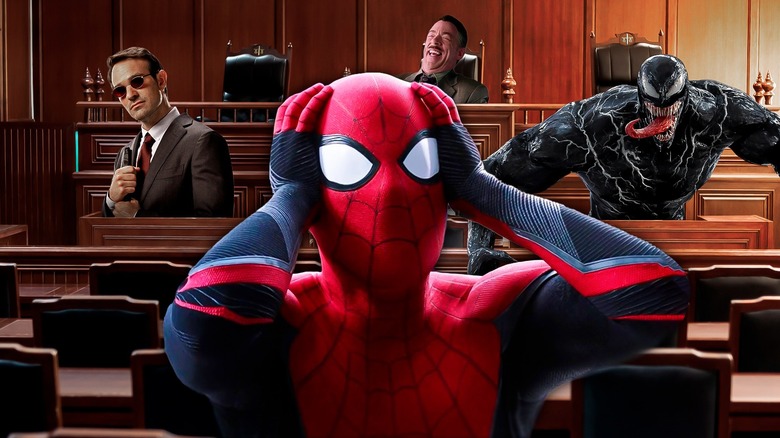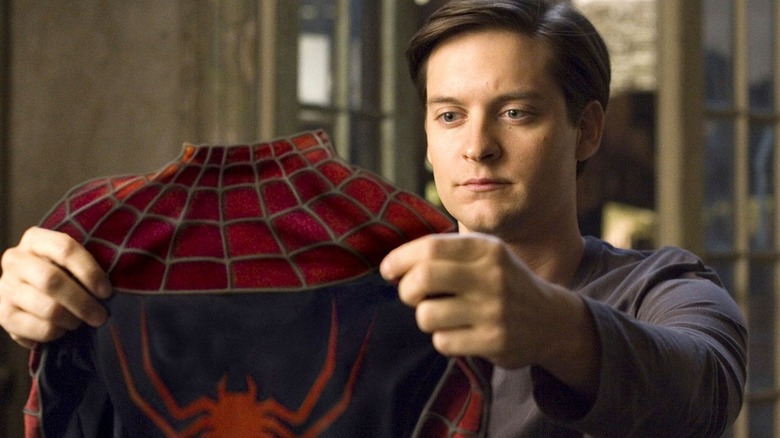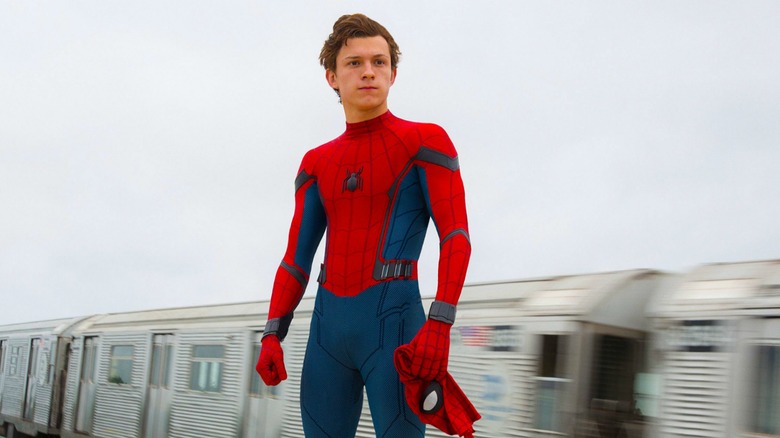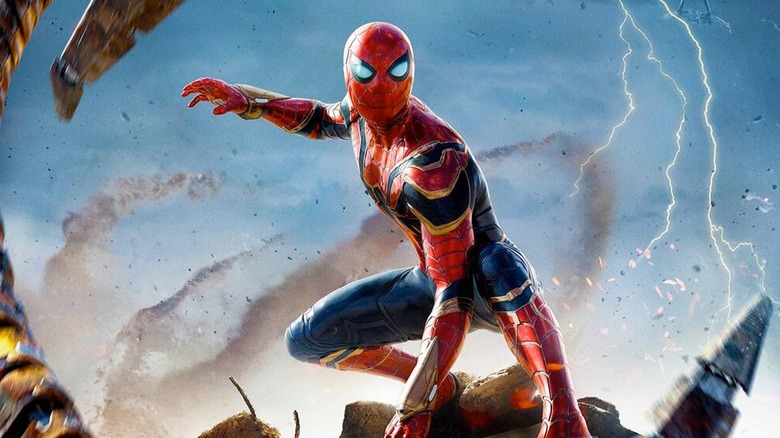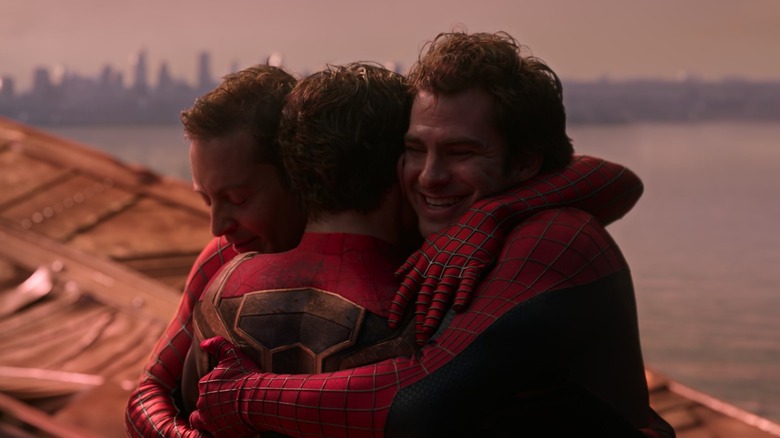Who Owns Spider-Man? Peter Parker's Complicated Marvel Movie Rights Explained
The history of Spider-Man on film is a complicated one. Despite being one of Marvel's most recognizable characters and appearing front and center in the Marvel Cinematic Universe, his movie rights have belonged to Sony Pictures Entertainment since 1998. How'd that happen?
The '90s was a tumultuous decade for the Marvel Entertainment Group. The early years saw the Marvel brand quickly expand from strictly comics to Saturday morning cartoons, countless toys, trading cards, and an endless stream of other merchandise. But by the mid-'90s, their bread and butter — comic books — had been seeing a decline in sales. Things were so bad that by 1996, Marvel filed for Chapter 11 bankruptcy.
The next year, the company was bailed out when it was acquired by Toy Biz and rebranded as Marvel Enterprises. Under new leadership, one of the first attempts at reestablishing Marvel as a titan of entertainment was to sell the film rights to some of its most famous characters. The first attempt at licensing a character proved successful with 1998's "Blade," which came from New Line Cinema. Before long, the movie rights to the X-Men and the Fantastic Four would land at 20th Century Studios, and Universal Films would have the Hulk. But Peter Parker had yet to find a home on the big screen. That's where Sony came in.
Sony's huge missed opportunity to acquire Marvel
Recognizing him as one of the publisher's most iconic characters, in 1998, a Sony exec named Yair Landau was brokering a deal with Marvel Comics for the cinematic rights to Spider-Man and any related characters like Venom, Morbius, Kraven the Hunter, and the rest of Peter Parker's sprawling web of allies and enemies. In a shocking counteroffer, according to The Wall Street Journal, Marvel proposed to sell the film rights to nearly its entire roster — including Iron Man, Black Panther, Thor, and more — for a staggeringly low $25 million.
But Sony was only interested in the Wall Crawler, with Landau reportedly being told by his bosses, "Nobody gives a sh*t about any of the other Marvel characters. Go back and do a deal for only Spider-Man." So, an agreement was made, with Sony acquiring the rights to Spider-Man for only $7 million. In return, Marvel would split merchandising profits and receive a small cut of box office returns for any Sony-produced Spidey films.
Considering the billions of dollars Spider-Man has made the studio in the years since, that $7 million has certainly paid dividends. Still, it's interesting to think what could have happened if Sony forked over the entire $25 million. The studio could have kicked off its own MCU a decade before 2008's "Iron Man." By comparison, in 2009, Disney paid $4 billion for Marvel Entertainment and its associated film rights — rights Sony would have owned had that deal been made.
So why is Spider-Man in Disney's MCU?
Though Sony's original Tobey Maguire-starring Spider-Man trilogy was a huge commercial hit, the last entry left many fans disappointed. Soon after, the studio was seeing diminishing returns with the character. When Andrew Garfield stepped in as Peter Parker in 2012's "The Amazing Spider-Man" and 2014's "The Amazing Spider-Man 2," the audience response was mostly lukewarm, and the box office returns were trending down. It seemed Sony was struggling to find an audience for their superhero movies. Meanwhile, the MCU was steamrolling through Hollywood.
By the end of 2014, the MCU was already 10 movies deep and almost done with Phase Two. So, with the franchise showing no signs of slowing down, Sony and Marvel opened discussions as to how Peter could swing into the MCU with Sony still retaining the rights. Eventually, a deal was struck that would see Sony lend the character to Marvel for five movies. In return, Sony would be allowed to use MCU characters in supporting roles in solo Spider-Man offerings, which is why we see the likes of Tony Stark in "Far From Home."
Sony would retain Spider-Man's film rights, and Marvel would be granted some creative control over Sony's offerings. The deal proved to be an immediate success for Sony, as "Spider-Man Homecoming," the first standalone Peter Parker movie following the agreement, outgrossed both "The Amazing Spider-Man" movies.
Navigating a tangled web
Unfortunately, this new relationship would be a rocky one, and before long, the studios were disputing over the character's profit-sharing. As early as 2017, former Sony executive Amy Pascal had many speculating that the Sony-Disney partnership could end after "Far From Home." Then, in August 2019, it was reported the partnership was officially dissolved.
However, thanks at least in part to the urging of Tom Holland, talks reopened, and by September, it was announced a new deal was made that would keep Holland's Peter Parker in at least two more MCU movies. The first was "No Way Home," but there's no word yet as to whether the second film included in that deal will be another solo movie set in the MCU or a larger ensemble piece like "Avengers: The Kang Dynasty," which he's rumored to lead.
Whatever the next movie is, it'll fulfill the agreement made between Sony and Marvel, at least as it stands now. But that doesn't mean we're not getting more.
Will Sony keep working with Disney?
Considering the massive success of introducing Spider-Man in the MCU, it was almost always certain Sony and Disney would come to another arrangement to keep Tom Holland around. "'No Way Home' is not the last movie that we are going to make with Marvel — [this is not] the last 'Spider-Man' movie," Amy Pascal told Fandango in 2021. "We are getting ready to make the next 'Spider-Man' movie with Tom Holland and Marvel. We're thinking of this as three films, and now we're going to go onto the next three. This is not the last of our MCU movies."
When EW asked Marvel Studios head Kevin Feige about Holland's future in the MCU, he promisingly teased: "All I will say is that we have the story. We have big ideas for that, and our writers are just putting pen to paper now." Pascal later told Variety work on the next film was already "in the process" before the writer's strike shut everything down.
Sony has controlled the Spider-Man rights for a quarter century now, and the character has never been more popular since the studio partnered with Marvel and let him fight alongside his fellow comic book heroes. Ever since Peter Parker's first MCU appearance in "Captain America: Civil War," Spider-Man has been a highlight of the franchise, and it doesn't look like this version of him will be going anywhere anytime soon.
